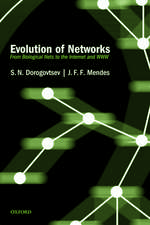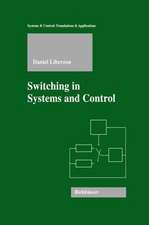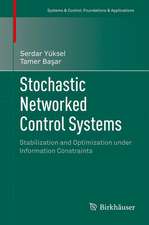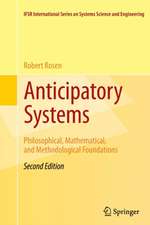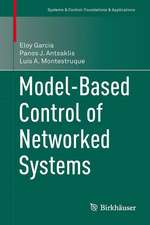Towards a Theoretical Framework for Analyzing Complex Linguistic Networks: Understanding Complex Systems
Editat de Alexander Mehler, Andy Lücking, Sven Banisch, Philippe Blanchard, Barbara Joben Limba Engleză Hardback – 21 iul 2015
| Toate formatele și edițiile | Preț | Express |
|---|---|---|
| Paperback (1) | 643.84 lei 6-8 săpt. | |
| Springer Berlin, Heidelberg – 17 oct 2016 | 643.84 lei 6-8 săpt. | |
| Hardback (1) | 650.19 lei 6-8 săpt. | |
| Springer Berlin, Heidelberg – 21 iul 2015 | 650.19 lei 6-8 săpt. |
Din seria Understanding Complex Systems
- 18%
 Preț: 1112.30 lei
Preț: 1112.30 lei -
 Preț: 439.25 lei
Preț: 439.25 lei - 18%
 Preț: 1119.38 lei
Preț: 1119.38 lei - 15%
 Preț: 401.82 lei
Preț: 401.82 lei - 18%
 Preț: 1247.26 lei
Preț: 1247.26 lei - 15%
 Preț: 641.20 lei
Preț: 641.20 lei - 15%
 Preț: 642.68 lei
Preț: 642.68 lei - 15%
 Preț: 651.51 lei
Preț: 651.51 lei - 18%
 Preț: 946.55 lei
Preț: 946.55 lei - 18%
 Preț: 947.98 lei
Preț: 947.98 lei - 20%
 Preț: 650.27 lei
Preț: 650.27 lei - 18%
 Preț: 952.09 lei
Preț: 952.09 lei - 18%
 Preț: 957.13 lei
Preț: 957.13 lei - 18%
 Preț: 943.88 lei
Preț: 943.88 lei -
 Preț: 398.35 lei
Preț: 398.35 lei - 5%
 Preț: 1417.54 lei
Preț: 1417.54 lei - 15%
 Preț: 648.42 lei
Preț: 648.42 lei -
 Preț: 387.75 lei
Preț: 387.75 lei - 18%
 Preț: 1133.76 lei
Preț: 1133.76 lei - 18%
 Preț: 948.16 lei
Preț: 948.16 lei - 20%
 Preț: 655.85 lei
Preț: 655.85 lei - 18%
 Preț: 1113.09 lei
Preț: 1113.09 lei - 20%
 Preț: 655.53 lei
Preț: 655.53 lei - 15%
 Preț: 653.00 lei
Preț: 653.00 lei - 18%
 Preț: 1332.92 lei
Preț: 1332.92 lei - 18%
 Preț: 1010.48 lei
Preț: 1010.48 lei - 18%
 Preț: 955.56 lei
Preț: 955.56 lei -
 Preț: 384.22 lei
Preț: 384.22 lei - 18%
 Preț: 950.66 lei
Preț: 950.66 lei - 15%
 Preț: 638.43 lei
Preț: 638.43 lei - 15%
 Preț: 644.49 lei
Preț: 644.49 lei - 15%
 Preț: 647.40 lei
Preț: 647.40 lei - 15%
 Preț: 649.06 lei
Preț: 649.06 lei - 15%
 Preț: 639.25 lei
Preț: 639.25 lei - 15%
 Preț: 643.65 lei
Preț: 643.65 lei - 18%
 Preț: 960.78 lei
Preț: 960.78 lei - 15%
 Preț: 649.87 lei
Preț: 649.87 lei - 15%
 Preț: 645.47 lei
Preț: 645.47 lei
Preț: 650.19 lei
Preț vechi: 764.93 lei
-15% Nou
Puncte Express: 975
Preț estimativ în valută:
124.43€ • 129.43$ • 102.72£
124.43€ • 129.43$ • 102.72£
Carte tipărită la comandă
Livrare economică 14-28 aprilie
Preluare comenzi: 021 569.72.76
Specificații
ISBN-13: 9783662472378
ISBN-10: 3662472376
Pagini: 370
Ilustrații: XXII, 343 p. 77 illus., 25 illus. in color.
Dimensiuni: 155 x 235 x 24 mm
Greutate: 0.69 kg
Ediția:1st ed. 2016
Editura: Springer Berlin, Heidelberg
Colecția Springer
Seria Understanding Complex Systems
Locul publicării:Berlin, Heidelberg, Germany
ISBN-10: 3662472376
Pagini: 370
Ilustrații: XXII, 343 p. 77 illus., 25 illus. in color.
Dimensiuni: 155 x 235 x 24 mm
Greutate: 0.69 kg
Ediția:1st ed. 2016
Editura: Springer Berlin, Heidelberg
Colecția Springer
Seria Understanding Complex Systems
Locul publicării:Berlin, Heidelberg, Germany
Public țintă
ResearchCuprins
Introduction.- Part I Cognition.- Part II Topology.- Part III Syntax.- Part IV Dynamics.- Part V Resources.
Textul de pe ultima copertă
The aim of this book is to advocate and promote network models of linguistic systems that are both based on thorough mathematical models and substantiated in terms of linguistics. In this way, the book contributes first steps towards establishing a statistical network theory as a theoretical basis of linguistic network analysis the boarder of the natural sciences and the humanities.This book addresses researchers who want to get familiar with theoretical developments, computational models and their empirical evaluation in the field of complex linguistic networks. It is intended to all those who are interested in statisticalmodels of linguistic systems from the point of view of network research. This includes all relevant areas of linguistics ranging from phonological, morphological and lexical networks on the one hand and syntactic, semantic and pragmatic networks on the other. In this sense, the volume concerns readers from many disciplines such as physics, linguistics, computer science and information science. It may also be of interest for the upcoming area of systems biology with which the chapters collected here share the view on systems from the point of view of network analysis.
Caracteristici
Presents the theoretical Framework for Analyzing Complex Linguistic Networks Advocates and promotes network models of linguistic systems that are both based on thorough mathematical models and substantiated in terms of linguistics Introduces a statistical network theory as a theoretical basis of linguistic network analysis across-the-board of the natural sciences and the humanities

